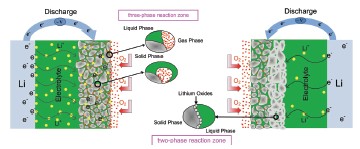| [1] Gu, D.-M.; Zhang, C.-M.; Gu, S.; Zhang, Y.; Wang, Y.; Qiang, L.-S. Acta Chim. Sinica 2012, 70, 2115. (顾大明, 张传明, 顾硕, 张音, 王余, 强亮生, 化学学报, 2012, 70, 2115.) [2] Abraham, K. M.; Jiang, Z. J. Electrochem. Soc. 1996, 143, 1.[3] Zhang, S. S.; Foster, D.; Read, J. J. Power Sources 2010, 195, 1235.[4] Zheng, J.-P.; Liang, R.-Y.; Hendrickson, M.; Plichta, E. J. Electrochem. Soc. 2008, 155, A432.[5] Kowalczk, I.; Read, J.; Salomon, M. Pure Appl. Chem. 2007, 79, 851.[6] Padbury, R.; Zhang, X. -W. J. Power Sources 2011, 196, 4436.[7] Wang, F.; Liang, C.-S.; Xu, D.-L.; Cao, H.-Q.; Sun, H.-Y.; Luo, Z.-K. J. Inorg. Mater. 2013, 27, 1233. (王芳, 梁春生, 徐大亮, 曹慧群, 孙宏元, 罗仲宽, 无机材料学报, 2013, 27, 1233.)[8] Gao, Y.; Wang, C.; Pu, W.-H.; Deng, C.-S. Battery Bimonthly 2011, 41, 161. (高勇, 王诚, 蒲薇华, 邓长生, 电池, 2011, 41, 161.)[9] Goodenough, J. B.; Kim, Y. Chem. Mater. 2010, 22, 587.[10] Read, J. J. Electrochem. Soc. 2002, 149, A1190.[11] Xu, W.; Xiao, J.; Wang, D.-Y.; Zhang, J.; Zhang, J.-G. J. Electrochem. Soc. 2010, 157, A219.[12] Xu, K. Chem. Rev. 2004, 104, 4303.[13] Xu, W.; Xiao, J.; Zhang, J.; Wang, D.-Y.; Zhang, J.-G. J. Electrochem. Soc. 2009, 156, A773.[14] Laoire, C. O.; Mukerjee, S.; Abraham, K. M.; Plichta, E. J.; Hendrickson, M. A. J. Phys. Chem. C 2010, 114, 9178.[15] The physical data were extracted and compiled from the following literature sources: (a) Jang, G. J.; Tomkins, R. P. T. Non-aqueous Electrolytes Handbook, Vol. 1, Academic Press, New York, 1972; (b) Dudley, J. T.; Wilkinson, D. P.; Thomas, G.; LeVae, R.; Woo, S.; Blom, H.; Horvath, C.; Juzkow, M. W.; Denis, B.; Juric, P.; Aghakian, P.; Dahn, J. R. J. Power Sources 1991, 35, 59; (c) Aldrich Handbook of Fine Chemicals and Laboratory Equipment, Aldrich Chemical Co., 2003~2004; (d) Ue, M.; Ida, K.; Mori, S. J. Electrochem. Soc. 1994, 141, 2989; (e) Ding, M. S.; Xu, K.; Zhang, S.; Jow, T. R. J. Electrochem. Soc. 2001, 148, A299.[16] Younesi, R.; Hahlin, M.; Bjorefors, F.; Johansson, P.; Edstrom, K. Chem. Mater. 2013, 25, 77.[17] Freunberger, S. A.; Chen, Y.-H.; Peng, Z.-Q.; Griffin, J. M.; Hardwick, L. J.; Bardé, F.; Novák, P.; Bruce, P. G. J. Am. Chem. Soc. 2011, 133, 8040.[18] Chen, Y.-H.; Freunberger, S. A.; Peng, Z.-Q.; Bardé, F.; Bruce, P. G. J. Am. Chem. Soc. 2012, 134, 7952.[19] McCloskey, B. D.; Speidel, A.; Scheffler, R.; Miller, D. C.; Viswanathan, V.; Hummelshøj, J. S.; Nørskov, J. K.; Luntz, A. C. J. Phys. Chem. Lett. 2012, 3, 997.[20] Peng, Z.-Q.; Freunberger, S. A.; Chen, Y.-H.; Bruce, P. G. Science 2012, 337, 563.[21] Read, J.; Mutolo, K.; Ervin, M.; Behl, W.; Wolfenstine, J.; Driedger, A.; Foster, D. J. Electrochem. Soc. 2003, 150, A1351.[22] Ue, M.; Mori, S. J. Electrochem. Soc. 1995, 142, 2577.[23] Schmidt, M.; Heider, U.; Kuehner, A.; Oesten, R.; Jungnitz, M.; Ignat'ev, N.; Sartori, P. J. Power Sources 2001, 97~98, 557.[24] Dominey, L. A.; Koch, V. R.; Blakley, T. J. Electrochim. Acta 1992, 37, 1551.[25] Walker, C. W.; Cox, J. D.; Salomon, M. J. Electrochem. Soc. 1996, 143, L80. [26] Zhang, D. M.S. Thesis, Fudan University, Shanghai, 2010. (张灯, 硕士论文, 复旦大学, 上海, 2010.)[27] Ue, M.; Murakami, A.; Nakamura, S. J. Electrochem. Soc. 2002, 149, A1572.[28] Ue, M.; Takeda, M.; Takehara, M.; Mori, S. J. Electrochem. Soc. 1997, 144, 2684.[29] Eggert, G.; Heitbaum, J. Electrochim. Acta 1986, 31, 1443.[30] Nanjundiah, C.; Goldman, J. L.; Dominey, L. A.; Koch, V. R. J. Electrochem. Soc. 1988, 135, 2914.[31] Xu, K.; Ding, M. S.; Jow, T. R. J. Electrochem. Soc. 2001, 148, A267.[32] Read, J. J. Electrochem. Soc. 2006, 153, A196.[33] Laoire, C. O.; Mukerjee, S.; Abraham, K. M.; Plichta, E. J.; Hendrickson, M. A. J. Phys. Chem. C 2009, 113, 20127.[34] Zhang, S. S.; Foster, D.; Read, J. Electrochim. Acta 2011, 56, 1283.[35] Ogasawara, T.; Débart, A.; Holzapfel, M.; Novák, P.; Bruce, P. G. J. Am. Chem. Soc. 2006, 128, 1390.[36] Xu, W.; Xiao, J.; Wang, D.-Y.; Zhang, J.; Zhang, J.-G. Electrochem. Solid-State Lett. 2010, 13, A48.[37] Xie, B.; Lee, H. S.; Li, H.; Yang, X.-Q.; McBreen, J.; Chen, L.-Q. Electrochem. Commun. 2008, 10, 1195.[38] Zhang, S. S.; Read, J. J. Power Sources 2011, 196, 2867.[39] Zhang, S. S.; Xu, K.; Read, J. J. Power Sources 2011, 196, 3906.[40] Zhang, S.-J.; Xu, C.-M.; Lv, X.-M; Zhou, Q. Ionic Liquids and Green Chemistry, Science Press, Beijing, 2009, p. 473.[41] Kuboki, T.; Okuyama, T.; Ohsaki, T.; Takami, N. J. Power Sources 2005, 146, 766.[42] Guo, Z.-Y.; Zhu, G.-N.; Qiu, Z.-J.; Wang, Y.-G.; Xia, Y.-Y. Electrochem. Commun. 2012, 25, 26.[43] Soavi, F.; Monaco, S.; Mastragostino, M. J. Power Sources 2013, 224, 115.[44] Zhang, D.; Okajima, T.; Matsumoto, F.; Ohsaka, T. J. Electrochem. Soc. 2004, 151, D31.[45] Gao, N.; Xu, Z.-M.; Gu, D.-M. CN 201110173415.5, 2011.[46] Kumar, B.; Kumar, J.; Leese, R.; Fellner, J. P.; Rodrigues, S. J.; Abraham, K. M. J. Electrochem. Soc. 2010, 157, A50.[47] Gu, D.-M.; Li, J.-C.; Yang, L.; Xiao, Y. Acta Chim. Sinica 2010, 68, 2367. (顾大明, 李已才, 杨柳, 肖宇, 化学学报, 2010, 68, 2367.) [48] Zhang, D.; Li, R.-S.; Huang, T.; Yu, A.-S. J. Power Sources 2010, 195, 1202.[49] Wang, H.; Imanishi, N.; Hirano, A.; Takeda, Y.; Yamamoto, O. J. Power Sources 2012, 219, 22. |
